Print is not dead, and online options are booming
by Dawn Emsellem-Wichowski, director of library services
A massive shift in the scholarly publication environment is underway. At McKillop Library, we are responding to these shifts with a strategic and measured approach. We regularly monitor the use of print and electronic materials as well as interlibrary loan and HELIN requests. Additionally, this year’s library survey will include an opportunity for faculty members and students to provide feedback about preferred formats and to assess the strengths and weaknesses of the library’s collections. This data will allow us to make informed decisions as we continue to develop and expand the library’s holdings.

Thanks to two endowed funds and a modest print budget, the library aims to purchase print copies of distinguished and award-winning titles across the disciplines and to fulfill most faculty requests for monographs. Over the last year, we promoted the library’s print book collection by reinstituting physical book displays and creating online book displays for new books and Choice Reviews Outstanding Academic Titles.
For the past two years, librarians have been engaged in a systematic assessment of library collections for the purpose of continuing to fulfill our mission to support the curriculum through collections and services.
Our progress so far:
- Evidence-based acquisition of e-books, with JSTOR EBA as a pilot.
- Support of greater streaming video availability with Academic Video Online.
- Moving toward greater availability of electronic journals with Sage Journals upgrade.
- Set a purchase schedule for print books so that new arrivals are added regularly
- Created new request forms for faculty to use in requesting e-journals and databases to help the library ensure that our e-resources support current curricular needs and keep track of faculty requests.
- Developed an annual process to monitor usage statistics of e-journals and databases, and annually notify faculty in relevant departments of new subscriptions and those at risk of being canceled for low use.
- Participated in professional development workshops and research on negotiation to improve pricing on subscriptions for electronic resources.
- Review of the library’s reference collection, including identifying materials for deaccession in disciplines where timeliness is important.
Projects in the works:
- Investigation into ways to expand our new releases displays so all new books can be reviewed by our community.
- Revision of the library’s collection development policy to help us keep up with advances in scholarly publication and changes in the business of scholarly publication.
New Databases & Journals @ Your Library
The library recently acquired access to the video database Academic Video Online (AVON), which includes approximately 65,000 videos. Click to view a list of videos grouped by subject. To link directly to a video in this database, make sure to use the permalink available under “Embed/Link” below each video. These videos are included in the library catalog.
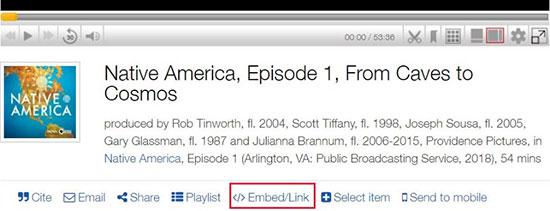 Updates to Existing Databases and Subscriptions
Updates to Existing Databases and Subscriptions
The library’s JSTOR subscription has been upgraded to include access to a large collection of over 40,000 ebooks. These are unlimited-user, Digital Rights Management (DRM)-free ebooks 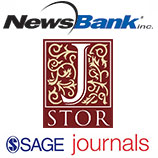 that have downloadable PDF files available for each chapter. You can find them by searching in the library catalog or directly in JSTOR. When searching in JSTOR, use the advanced search screen to limit your search to ebooks.
Our Sage Journals package has also been upgraded to a larger collection of 1,179 journals.
The library now offers online access to the page-image edition of both the Newport Daily News and the Providence Journal from Newsbank. These include the same day’s issue, and allow you to view the newspaper as it would appear in print.
The library has also newly subscribed to the following individual journals:
Archives & Special Collections News
The Archives has published finding aids for the papers of Sister Mary James O’Hare, the first academic dean, processed by volunteer Michaela Sheerar.
In the fall, the Archives completed the first stage of the Documenting Slavery project, funded by the Rhode Island Foundation’s Joseph O’Neill Ott Fund. In this project, Sarah Christiana ’21 described digitized colonial documents from South Kingstown. The documents are available in JStor Forum at https://tiny.cc/sk-colonial-records. Through the Poulin Archives Fellow program, the work continues this semester. The program is also funding the processing and digitization of photographs from the Department of Athletics by Kylee Babcock ’20.
In January, Archivist and Special Collections Librarian Genna Duplisea was appointed to the Rhode Island Historical Records Advisory Board.
You can follow Salve Regina Archives and Special Collections on Facebook and Twitter @SalveArchives.
Campus Crowdsource: Mary Church Terrell
by Nicole Marino, digital scholarship and instruction librarian
On March 20, several members of the Salve community came together to contribute to a campaign to transcribe the papers of Mary Church Terrell (1863-1954), a prominent educator, suffragist, and civil rights activist. Terrell was the first black woman appointed to the District of Columbia Board of Education as well as the founding president of the National Association of Colored Women (NACW) and a founder of the National Association for the Advancement of Colored People (NAACP).
Using the Library of Congress’ new crowdsourcing tool, " By the People," participants spent a fun and relaxing afternoon in McKillop Library contributing to the accessibility of women’s history and learning about Terrell’s life and works through primary source documents. Because text recognition software that helps make many typed documents searchable is not always optimized for the diversity of human handwriting or the qualities of certain types of paper, cultural heritage institutions often need help from volunteers to hand-type historical papers. The transcriptions completed during the workshop will be reviewed by other volunteers and then returned to the Library of Congress website where they will be newly discoverable and accessible to a wide range of audiences.
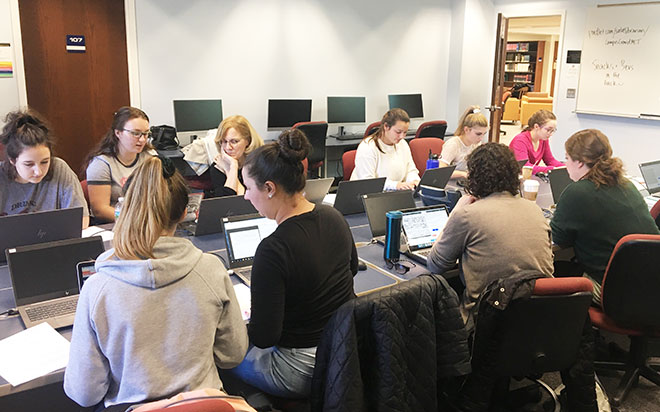
Crowdsourcing allows people to contribute to large projects and datasets that cannot be analyzed, organized, or described by computers or smaller groups of people. This could involve anything from transcribing and tagging archival documents to make the text searchable for researchers to identifying animals in image captures from wildlife cameras for biologists researching ecosystem ecology.
Along the way, people who donate their efforts to these projects benefit by:
- learning about the subject(s) and research involved in each project
- practicing skills such as reading handwriting from centuries past (especially important for aspiring historians!)
- strengthening participation in and understanding of knowledge production and use, content ownership, and digital citizenship
If you have ever used Wikipedia then you have reaped the benefits of crowdsourcing! As an openly-editable encyclopedia, Wikipedia could not exist without the continuous contributions and revisions of the public at large.
McKillop Library is piloting a series of crowdsourcing events where Salve community members can come together and contribute to digital projects organized by institutions like the Library of Congress and the Smithsonian that cover a range of topics in the humanities and sciences. If there is continued interest in this type of initiative, we are hoping to collaborate with faculty and student groups on future events! If you’d like to discuss the possibilities for holding a crowdsourcing event related to your discipline, please contact Nicole Marino, digital scholarship and instruction librarian, at nicole.marino@salve.edu.
Johannes von Gumppenberg Exhibit Opens at McKillop Library
 The vibrant acrylic paintings on exhibit in the foyer between the second and third floors of the McKillop Library are the work of modern artist Johannes von Gumppenberg and include Pine Tree on Promontory, The Red Cup, and Demon over the Susquehanna
The vibrant acrylic paintings on exhibit in the foyer between the second and third floors of the McKillop Library are the work of modern artist Johannes von Gumppenberg and include Pine Tree on Promontory, The Red Cup, and Demon over the Susquehanna. His work demonstrates a lifelong interest in modern art and design and a desire to explore the fundamentals underlying new freedoms. Through the years he has expressed his ideas in prepared plates, and used his own teachings to make each illustration an individual work of art.
Born in Germany in 1931, von Gumppenberg studied illustration at Rhode Island School of Design, graduating in 1955, and then earned his MFA from Yale University in 1962. He also studied painting at Munich Academy of Fine Arts. During his teaching career, he was on the faculty of the University of Illinois and Kalamazoo College, and taught privately for many years as well. He retired to Jamestown, Rhode Island, where he lives with his wife Janet von Gumppenberg.

The Von Gumppenbergs are also working with University Archives and Special Collections to build a large digital collection of artwork. The first stage of this project has been publishing digital books in Digital Commons.
|

 All programs/events are free and open to the Salve community unless otherwise noted.
Campus Read: "Black Klansman: Race, Hate, and the Undercover Investigation of a Lifetime" by Ron Stallworth.
Monday, April 8, 4:00 p.m.
All programs/events are free and open to the Salve community unless otherwise noted.
Campus Read: "Black Klansman: Race, Hate, and the Undercover Investigation of a Lifetime" by Ron Stallworth.
Monday, April 8, 4:00 p.m.
McKillop Library 1st FL
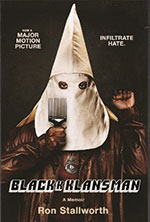
Diversity & Inclusion Task Force and Faculty Fellows host a student/faculty-led discussion about the recent bestseller and film "Blackklansman." Open to all-- come share your ideas! Refreshments provided.
Take Our Faculty Survey - Win $100 Amazon.com Gift Card
 Starting April 22 through May 6, McKillop Library is offering an additional satisfaction survey targeted to faculty.
Starting April 22 through May 6, McKillop Library is offering an additional satisfaction survey targeted to faculty. We acknowledge that economic, social, and technological changes are critical to our decisions about library resources and spaces. Our goal is to understand more deeply the nuanced attitudes and behaviors of students and faculty as we strive to remain responsive to the needs and success of all our users. Watch your Salve email for the survey invite! One winner will be chosen by random draw to receive a $100 Amazon.com gift card!

The library will be open extended hours during exam week. In addition to our free coffee nights at the beginning of exam week, be on the lookout for the roving snack cart!
 ’Any free human work produces Beauty’ – a celebration of Ade Bethune
’Any free human work produces Beauty’ – a celebration of Ade Bethune
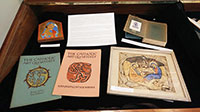
For Women’s History Month, Genna Duplisea, Gretchen Sotomayor, and work-study Amy Veron ‘21 mounted a new display, “’Any free human work produces Beauty’ – a celebration of Ade Bethune.” Longtime Newporter Ade Bethune (1914-2002) was a liturgical illustrator, artist, and activist. The display is located outside room 109 in the library. More info and photos at https://library.salvereginablogs.com/library-display-any-free-human-work-produces-beauty-a-celebration-of-ade-bethune/.
Earth Matters
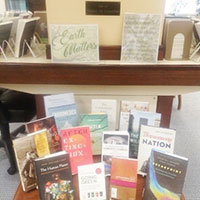
A display of various environmental topics, including climate change, recycling, green living, religious & spirital aspects of ecology, & general stewardship for Mother Earth. Located on the 1st FL across from the information desk.
Monthly Displays
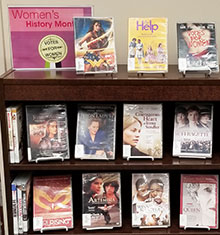
Each month we have a rotating diversity book display and associated DVD display on a particular theme. This month our display is abouot Women's History, to coincide with Women's History Month. For April, our display will be about sexual assault awareness and for May, mental health awareness. Come see our displays and borrow anything that interests you!
 We are excited to announce two staff promotions at McKillop Library!
We are excited to announce two staff promotions at McKillop Library!
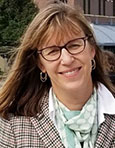 Gretchen Sotomayor, M.L.I.S. Gretchen Sotomayor, M.L.I.S. has accepted the position of special programs and instruction librarian. She will promote outreach and plan library events as our Special Programs librarian and continue to support the Departments of Modern & Classical Languages, Political Science, and Psychology in her role as Instruction librarian. Gretchen is eager to enhance the library’s role in supporting faculty research and scholarship, and looks forward to developing campus partnerships in support of information literacy initiatives.
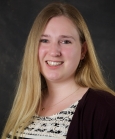 We are pleased to have Beth Blycker-Koll with us year-round starting July 1st! Beth already wears many hats at McKillop Library, and has taken on new responsibilities, working closely with Gretchen to coordinate the scheduling and promotion of special events at McKillop Library. Congratulations to Beth as our circulation and library logistics manager.

Connect with Us!   
|




 that have downloadable PDF files available for each chapter. You can find them by searching in the library catalog or directly in JSTOR. When searching in JSTOR, use the advanced search screen to limit your search to ebooks.
that have downloadable PDF files available for each chapter. You can find them by searching in the library catalog or directly in JSTOR. When searching in JSTOR, use the advanced search screen to limit your search to ebooks. 
 The vibrant acrylic paintings on exhibit in the foyer between the second and third floors of the McKillop Library are the work of modern artist Johannes von Gumppenberg and include Pine Tree on Promontory, The Red Cup, and Demon over the Susquehanna.
The vibrant acrylic paintings on exhibit in the foyer between the second and third floors of the McKillop Library are the work of modern artist Johannes von Gumppenberg and include Pine Tree on Promontory, The Red Cup, and Demon over the Susquehanna.  The Von Gumppenbergs are also working with University Archives and Special Collections to build a large digital collection of artwork.
The Von Gumppenbergs are also working with University Archives and Special Collections to build a large digital collection of artwork. 


 Starting April 22 through May 6, McKillop Library is offering an additional satisfaction survey targeted to faculty. We acknowledge that economic, social, and technological changes are critical to our decisions about library resources and spaces. Our goal is to understand more deeply the nuanced attitudes and behaviors of students and faculty as we strive to remain responsive to the needs and success of all our users. Watch your Salve email for the survey invite! One winner will be chosen by random draw to receive a $100 Amazon.com gift card!
Starting April 22 through May 6, McKillop Library is offering an additional satisfaction survey targeted to faculty. We acknowledge that economic, social, and technological changes are critical to our decisions about library resources and spaces. Our goal is to understand more deeply the nuanced attitudes and behaviors of students and faculty as we strive to remain responsive to the needs and success of all our users. Watch your Salve email for the survey invite! One winner will be chosen by random draw to receive a $100 Amazon.com gift card!


 For Women’s History Month, Genna Duplisea, Gretchen Sotomayor, and work-study Amy Veron ‘21 mounted a new display, “’Any free human work produces Beauty’ – a celebration of Ade Bethune.” Longtime Newporter Ade Bethune (1914-2002) was a liturgical illustrator, artist, and activist. The display is located outside room 109 in the library. More info and photos at
For Women’s History Month, Genna Duplisea, Gretchen Sotomayor, and work-study Amy Veron ‘21 mounted a new display, “’Any free human work produces Beauty’ – a celebration of Ade Bethune.” Longtime Newporter Ade Bethune (1914-2002) was a liturgical illustrator, artist, and activist. The display is located outside room 109 in the library. More info and photos at  A display of various environmental topics, including climate change, recycling, green living, religious & spirital aspects of ecology, & general stewardship for Mother Earth. Located on the 1st FL across from the information desk.
A display of various environmental topics, including climate change, recycling, green living, religious & spirital aspects of ecology, & general stewardship for Mother Earth. Located on the 1st FL across from the information desk.  Each month we have a rotating diversity book display and associated DVD display on a particular theme. This month our display is abouot Women's History, to coincide with Women's History Month. For April, our display will be about sexual assault awareness and for May, mental health awareness. Come see our displays and borrow anything that interests you!
Each month we have a rotating diversity book display and associated DVD display on a particular theme. This month our display is abouot Women's History, to coincide with Women's History Month. For April, our display will be about sexual assault awareness and for May, mental health awareness. Come see our displays and borrow anything that interests you!
 Gretchen Sotomayor, M.L.I.S. has accepted the position of special programs and instruction librarian. She will promote outreach and plan library events as our Special Programs librarian and continue to support the Departments of Modern & Classical Languages, Political Science, and Psychology in her role as Instruction librarian. Gretchen is eager to enhance the library’s role in supporting faculty research and scholarship, and looks forward to developing campus partnerships in support of information literacy initiatives.
Gretchen Sotomayor, M.L.I.S. has accepted the position of special programs and instruction librarian. She will promote outreach and plan library events as our Special Programs librarian and continue to support the Departments of Modern & Classical Languages, Political Science, and Psychology in her role as Instruction librarian. Gretchen is eager to enhance the library’s role in supporting faculty research and scholarship, and looks forward to developing campus partnerships in support of information literacy initiatives.
 We are pleased to have Beth Blycker-Koll with us year-round starting July 1st! Beth already wears many hats at McKillop Library, and has taken on new responsibilities, working closely with Gretchen to coordinate the scheduling and promotion of special events at McKillop Library. Congratulations to Beth as our circulation and library logistics manager.
We are pleased to have Beth Blycker-Koll with us year-round starting July 1st! Beth already wears many hats at McKillop Library, and has taken on new responsibilities, working closely with Gretchen to coordinate the scheduling and promotion of special events at McKillop Library. Congratulations to Beth as our circulation and library logistics manager.